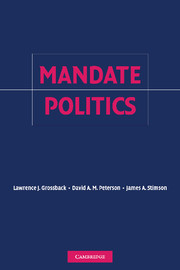Book contents
- Frontmatter
- Contents
- List of Figures
- List of Tables
- Preface
- Acknowledgments
- 1 A Single Time in a Single Place
- 2 The Evolution of Mandates
- 3 Members of Congress Respond
- 4 The Pattern of Congressional Response
- 5 Consequences
- 6 The Irresistible Meets the Unmovable
- 7 Conclusion: A Mandate View of Normal American Politics
- Bibliography
- Index
5 - Consequences
Published online by Cambridge University Press: 14 August 2009
- Frontmatter
- Contents
- List of Figures
- List of Tables
- Preface
- Acknowledgments
- 1 A Single Time in a Single Place
- 2 The Evolution of Mandates
- 3 Members of Congress Respond
- 4 The Pattern of Congressional Response
- 5 Consequences
- 6 The Irresistible Meets the Unmovable
- 7 Conclusion: A Mandate View of Normal American Politics
- Bibliography
- Index
Summary
We wrote in Chapter 1 of great legislative struggles and momentous attempts to compromise them. In this chapter, we return to the issue of the consequences that ensue when the Washington community reaches the consensus that an election carried a message of voter intent. Our job here is to look systematically at the product of mandated Congresses – the laws enacted and policies forever changed – asking first how different was their outcome because of the mandate signal and then how different is public policy in America because these three particular episodes occurred.
We will observe these three Congresses as historical events and then we will take up the more systematic tools of political science to assesses exactly which actions would have been otherwise if not for the mandate signal at the crucial moment of decision. We deal in order with mandate induced changes in rules and procedures, then in a counterfactual analysis of what outcomes might have been without the mandate message, and then we examine the product of these Congresses in the longer view of American public policy.
Before the course of American politics can be altered, Congress must organize itself. Before the policy battles, bill introductions, and roll calls comes the rules. So that is where we begin.
- Type
- Chapter
- Information
- Mandate Politics , pp. 131 - 160Publisher: Cambridge University PressPrint publication year: 2006



